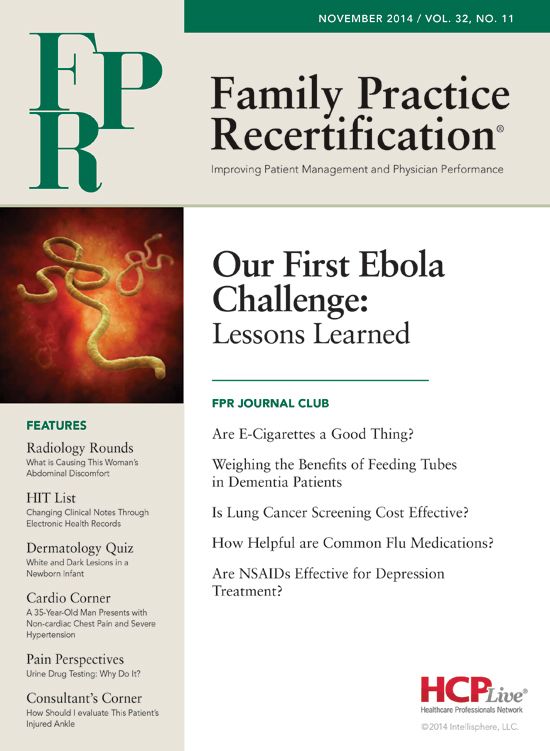Are NSAIDs Effective for Depression Treatment?
This systematic review and meta-analysis hope to determine the influence of non-steroidal anti-inflammatory agent use on depressive symptoms and in those with depression.

Frank J. Domino, MD
Review
“Using NSAID’s to Treat Depression: A Systematic Review” JAMA Psychiatry. 2014 October 15. DOI: 10.1001/JAMA Psychiatry.2014.1611.
Study Methods
Using standardized systematic review procedures, 10 studies were identified evaluating 14 trials on the use of anti-inflammatory agents in patients with depression or depressive symptoms. Ten of the studies evaluated the use of non-steroidal anti-inflammatory agents and 4 studied cytokine inhibitors. To make this study reflective of current clinical practice, patients could have been enrolled with a diagnosis of depression or experienced depressive symptoms and may or may not have been on an antidepressant at the time of enrollment.
Outcome measures included:
- A significant reduction in depressive symptoms based upon a continuous scale at the end of the evaluation,
- Response measured at the end of the intervention,
- Serious adverse side-effects,
- Remission in patients with depression based upon the Hamilton Rating Scale of Depression scores (considered a Hamilton score < 7).
Results
Significant decreases in depressive scores were found in both patients with depression and those with depressive symptoms. Analysis favored the anti-inflammatory treatment over a placebo for remission (odds ratio = 2.73; 95% CI, 1.37-5.46) and in response (or = 2.41; 95% CI, 1.12-5.20).
With regards to side-effects none of the NSAID trials showed an increased risk for gastrointestinal symptoms or cardiovascular adverse outcomes. Cytokine inhibitors also did not demonstrate significantly associated increased rates of infection at 12 weeks.
The authors of this meta-analysis noted that the potential for bias was high in all the studies included because of incomplete reporting of randomization and limited intention to treat analysis. There was also some concern as a number of the studies were funded by the industry that made the agents being evaluated.
Under sub-analysis, the COX-2 inhibitor celecoxib demonstrated significant superiority over other agents in 10 of the trials. But when celecoxib was used as montherapy, there was borderline significance of benefit. This is in contrast to when celecoxib was used as an add-on to anti-depressants therapy, which showed significant improvement compared to placebo resulting in improved remission rates (OR = 7.89; 95% CI, 2.94-21.17) and in response (OR = 6.59; 95% CI, 2.24-19.42).
Conclusion
Patient outcomes were improved in this meta-analysis of randomized controlled trials of anti-inflammatory agents alone and when added to traditional anti-depressant therapy.
Discussion
When undertaking the treatment of depression, the combination of medication and interpersonal therapy, in particular cognitive behavioral therapy, are found to be both best practice and have the greatest impact on long-term outcomes. This paper may shed new light on both the pathophysiology of depression and depressive symptoms as well as a new method to improve outcomes with a class of medication most of us in primary care feel comfortable using.
How could non-steroidal anti-inflammatory improve depressive symptoms? The authors do not have a solid answer, but do hypothesize the benefit of NSAID’s may be due to a decrease in the somatic symptoms of depression.
To make matters more confusing there are some observational studies that have found NSAID’s do not help. Of those studies that evaluated laboratory data, it appeared that patients who had increased pro-inflammatory markers in their blood received the greatest benefit from the anti-inflammatory medications.
In this study, sub-analysis demonstrated the superiority of the COX-2 inhibitor celebroxib with regard to anti-depressant therapy and found it to be most effective in the first 6-8 weeks of anti-depressant treatment. The studies included had bias risk, and should be best understood in that light.
The authors of this study raise a number of issues around bias, in particular incomplete reporting of how patients were randomized as well as concern about the funders of the study having a vested interest in a beneficial outcome. Nonetheless, adding an anti-inflammatory agent to traditional anti-depressant medication and cognitive behavioral therapy seems to be a reasonable consideration, at least for the first 8 weeks of treatment, especially in those who have significant somatic symptoms.
The risk of NSAID use in this population and time frames is extremely small and the potential benefit of an improved anti-depressant response to initial treatment seems great. It does not seem prudent to initiate measures of inflammation in the blood (i.e. C-reactive protein and interleukin 6 measurements) in the evaluation of patients with depression. But if patients have depressive symptoms with significant musculoskeletal or inflammatory symptoms, the inclusion of an anti-inflammatory, and possibly the COX-2 inhibitor celecoxib, seem worthwhile.
About the Author
Frank J. Domino, MD, is Professor and Pre-Doctoral Education Director for the Department of Family Medicine and Community Health at the University of Massachusetts Medical School in Worcester, MA. Domino is Editor-in-Chief of the 5-Minute Clinical Consult series (Lippincott Williams & Wilkins).
Additionally, he is Co-Author and Editor of the Epocrates LAB database, and author and editor to the MedPearls smartphone app. He presents nationally for the American Academy of Family Medicine and serves as the Family Physician Representative to the Harvard Medical School’s Continuing Education Committee.
